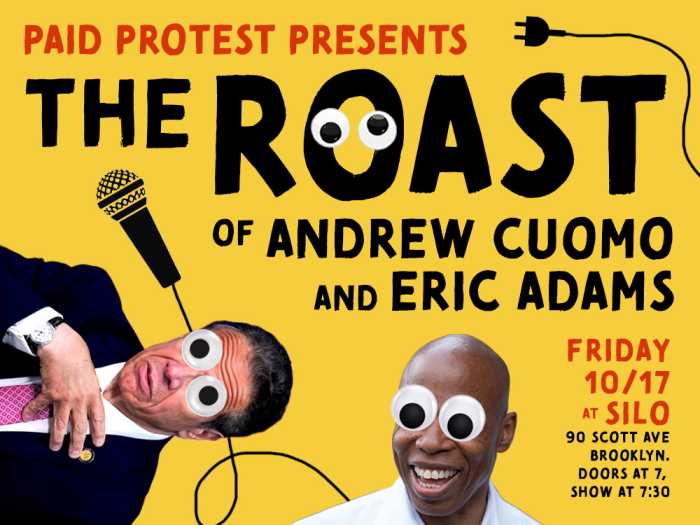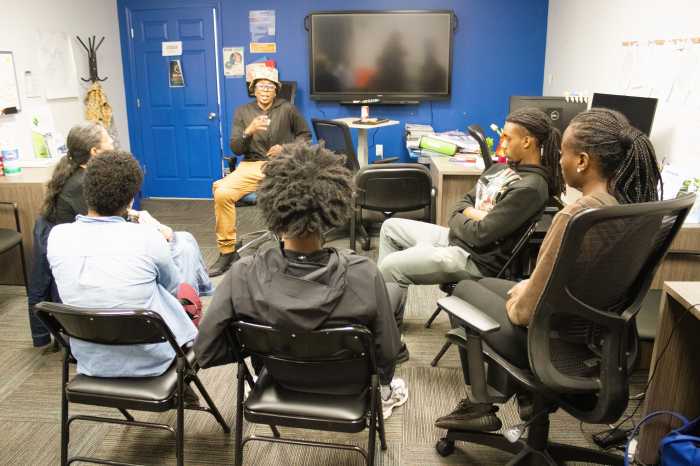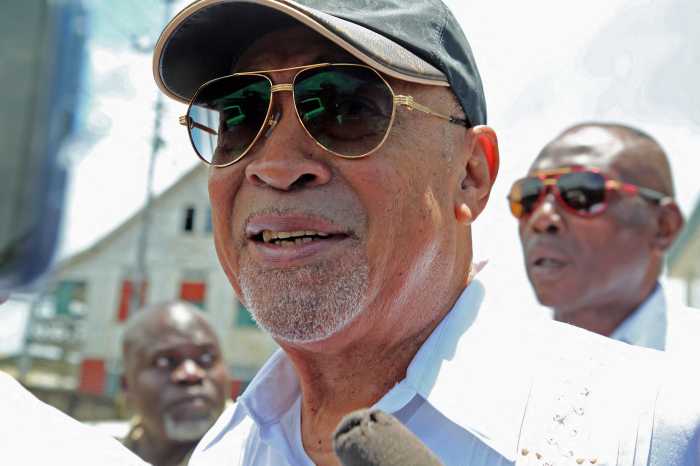Assemblyman Scott Stringer says he has the skill set to lead the borough of Manhattan
In a nine-person race for the Manhattan borough presidency, in which two of the candidates—Lower East Side City Councilwoman Margarita Lopez and attorney Brian Ellner, a former elected community school board president—are openly lesbian or gay, the decision in early June by the Gay and Lesbian Independent Democrats, the city’s oldest queer political club, to endorse Scott Stringer, a straight, six-term state assemblyman from the Upper West Side, caught some observers by surprise.
To be sure, Stringer is a strong, indeed unequivocal supporter of gay rights, but the fact—confirmed by GLID president Melissa Sklarz—that the assemblyman garnered more than 70 percent of the tally of roughly 115 club members voting, led, perhaps unsurprisingly, to some cries of foul.
Lopez called the vote “a sham.”
“Club packing may be a part of politics as usual,” Ellner said, “but that is exactly the kind of politics we are trying to change.”
The harshest criticism, however, came from a colleague of Stringer’s, Deborah Glick, a Chelsea lesbian and Lopez supporter, who said, “Packing clubs is a time honored tradition. But in the 1980s, we packed the club with gay people to vote an endorsement for a gay man, David Rothenberg [running for City Council]. This is a packing of the club with gay and straight people, largely with people who are campaign staff, or from the staffs of elected officials.”
The question was put—is the gay and lesbian community taking care of its own?
Just to be certain that the record is absolutely clear—Scott Stringer is having none of it.
“You know, Margarita and some others say, ‘Oh he packed GLID.’ Nonsense,” Stringer said, at an August 11 meeting with publishers and editors of Gay City News, The Villager, and Downtown Express. “I was [GLID’s] legislator of the year in 1996.”
The 45-year-old assemblyman laid out a commitment to lesbian, gay, bisexual, and transgender rights that dates back to his early forays in politics in the 1980s.
“I have a long history going back to my days in the Young Democrats going down to City Hall to testify in favor of the gay rights bill, “he said. “We all have friends who are no longer here due to AIDS. When I got to Albany, it was very easy to make connections to the marriage bill, to the nondiscrimination bill.”
In recalling his advocacy for the community, Stringer even recalled a controversy that was searing in 1998, but is probably largely forgotten by the gay community and even by AIDS activists—the battle to beat back a proposal by Queens Assemblywoman Nettie Mayerson requiring that all newborn infants in the state be tested for HIV, with or without the mother’s consent. Mayerson argued that the measure was needed to provide critical early care to babies born with the HIV virus, but AIDS activists resisted any encroachment of mandatory testing and pointed to evidence that such measures undermine confidence in the health care system needed for consumers to proactively seek preventive care.
Mayerson created a political firestorm that many friends of the gay and AIDS activist community found impossible to withstand. Stringer was among those who stood tough.
“It was very controversial,” he recalled, “but I stood alone, obviously with activists, but otherwise it was not particularly popular.”
Stringer remains a leader on LGBT rights.
“I was one of the original sponsors of the marriage bill,” he said, of the measure first introduced in the Assembly by fellow Manhattan Democrat Dick Gottfried, and later in the Senate by Tom Duane, the gay Chelsea legislator. “Now it has gotten some legislative cachet, which we are glad of, though of course it is still controversial in the Legislature, the fear from some, ‘It’s going to topple our Democratic majority.’”
That concern about the Democratic majority is something of an obsession for Assembly Speaker Sheldon Silver from the Lower East Side, who leads more than 100 of his fellow Democrats in the 150-member body—one of the widest majorities in history—yet stews about the potential for losing seats. Despite the growing number of Democratic assemblymembers who support same-sex marriage rights, the issue is currently going nowhere in the Legislature, especially given the firm hand upstate Republican Joseph Bruno has on the Senate.
As with so many progressive issues, the key question facing sympathetic Albany Democrats is how hard they are willing to press their
speaker for action.
Throughout the interview, Stringer volunteered numerous examples of how he has been willing to show independence from Silver. On the marriage issue, when asked whether direct lobbying from Republican Mayor Michael Bloomberg—who pledged to fight for same-sex marriage in Albany should he succeed in overturning on appeal the February marriage ruling from a Manhattan state court—would be helpful, Stringer didn’t hesitate.
“Absolutely,” he said. “Will [gay marriage] come sooner if people step up and put their money where there mouth is? Yeah, get up there. We need you to come up to Albany and speak to these basic civil rights issues and force the Assembly to get that bill out.”
It’s not often when Democratic members of the Assembly suggest that Silver is either taking the wrong stand or dragging his feet. Stringer talked about how he reached across the political aisle six years ago to work with former Mayor Rudolph Giuliani unsuccessfully to fight Silver’s acquiescence in the state Senate’s elimination of the commuter tax on people who work in New York City but live elsewhere.
But Stringer also offered a more successful example of his standing up to the Assembly leadership—his work to reform the rules of the Assembly that followed the devastating report last year from NYU’s Brennan Center for Justice that ranked the New York State Legislature as the worst in the nation. He noted with pride that prior to his efforts to implement what he called the Stringer resolution, for which he found 27 Democratic co-sponsors, The New York Times said no incumbent assemblymember deserved reelection but that after his success and the completion of the session in June, the newspaper observed something to the effect of “Every legislator can go home a reformer.”
“It was certainly the most successful session since I’ve been there,” he said. “And I did that. I took on the Assembly leadership. I took on the members.”
Stringer is careful to emphasize that his independence is balanced by his ability to work with others, a thinly veiled shot at the person he sees as his main competitor in the race—East Side Councilwoman Eva Moskowitz, who he characterized as proclaiming “I don’t have any political support” as a badge of honor.
“That’s not the way you get things done,” he insisted. “You need to work with people.”
Curiously, the endorsement of Stringer by The New York Times weeks after this August 11 interview made much the same point, dismissing Moskowitz by writing that she is “smart and driven and an expert on education issues, although her style—often described by those who have worked with her as abrasive—would not be well suited to this office.”
The example Stringer offered of his ability to forge alliances and consensus related to education—his key opponent’s strong suit—and to concerns of the LGBT community. Ever since the dismal failure of the proposed Children of the Rainbow Curriculum during David Dinkins’ mayoralty, AIDS advocates have unsuccessfully pressed for meaningful HIV education in the public schools, including discussions of condoms as a prevention tool. Based on a study his office put together, Stringer said he brought together Steven Sanders, the chairman of the Assembly education committee, a group of 21 advocacy groups led by the New York AIDS Coalition, and New York City Schools Chancellor Joel Klein to examine why city schools were failing to meet mandates set down by city and state law.
“I got Joel Klein to say to me, ‘You keep fighting on this and we’ll revise the curriculum,’” Stringer said. “We did it. We now have an HIV/AIDS curriculum; it’s now been revised. It hasn’t been revised since 1991. It’s a tremendous victory. Can you imagine what we could do with a bigger staff at the borough president’s office?”
Voters may have to wait, however, to judge the results of the curriculum effort. The Department of Education acknowledges that it will introduce a new plan this fall, but not at the beginning of the term, nor have the details been released. Some observers have speculated that the plan will not be put in place until after the November election.
Independence, the ability to work collaboratively with political allies and opponents, and the term “skill set” were the three major themes that dominated Stringer’s comments over a 75-minute discussion. In a campaign document that the assemblyman admitted may make him look like a policy wonk, he has laid out detailed proposals for reforming the borough’s local community boards, increasing affordable housing, spurring economic development, supporting public school families, and greening Manhattan.
Stringer is keen to point out every single lever of power—appointments, seats on city commissions and boards, and budgetary allocations—that the borough president’s office has at its disposal, but is also pragmatic about the job’s potential.
“The office is limited,” he acknowledged. “You are not the mayor. You are not even the Council speaker. You have to have relationships to have success. You can go out the door and have press conferences and accomplish nothing. Some people do that. Here, in order to have tangible results, you are going to have to have interactions.”
gaycitynews.com













